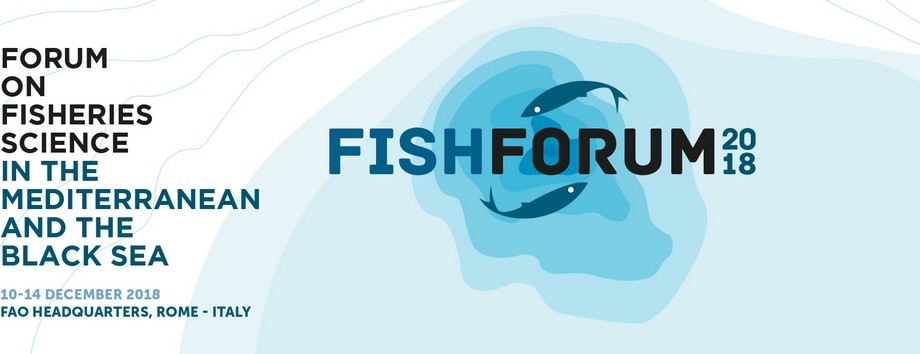+450 Participants | +230 Abstracts on technical research | + 30 Partner organizations
More than 450 experts and scientists from 45 countries as well as from several international organizations, non-governmental organizations and other stakeholders gathered at FAO headquarters, in Rome, from 10 to 14 December to discuss the state of the art of fisheries science in the region and identify research priorities for the coming decade. This event, organized by the General Fisheries Commission for the Mediterranean, was the first of this kind for the region, encompassing oceanographic, social science and economic perspectives on fisheries research.
"We are particularly satisfied as the Fish Forum 2018 created a unique opportunity for scientists from all over the world to share and exchange on their research” said Abdellah Srour, GFCM Executive Secretary. “The success of this event proves that we crucially need to move towards more collaboration for better science, especially in light of the specificities of the Mediterranean and the Black Sea. This is particularly true in a context where climate change, non-indigenous species and plastic pollution are growing issues” for the region.
The discussions held at plenary and parallel sessions as well as workshops during these four days highlighted the need for more integrative and transparent data covering all aspects related to fisheries, marine ecosystems, environment and socio-economics. Moreover, new spatial models and methodologies were presented and the need to allow for better comparisons between countries emerged. To this end, a proposal was made to build a network of research institutes across the Mediterranean and the Black Sea.
The Fish Forum 2018 was also a timely opportunity in view of the upcoming United Nations Decade for Oceans Science as it will hopefully help supporting scientists in making science a priority for fisheries management.
"The Fish Forum 2018 is the starting point of an important digital use of available data. More than ever, we need to build on cooperation in order to increase our ability to share data”, concluded Stefano Cataudella, outgoing GFCM Chairperson.
Main conclusions of the Fish Forum 2018
-
Managing simultaneously a diversity of environmental and anthropogenic issues other than fisheries (climate change, pollution, eutrophication, mining, non-indigenous species, etc.) requires creative solutions to ensure biodiversity conservation and fisheries sustainability.
-
The role of the GFCM in promoting cooperation in the Black Sea basin between contracting parties and cooperating non-contracting parties proves to be essential for improved governance in the region and should continue in the same direction.
-
The increase in non-indigenous and invasive species across the Mediterranean and the Black Sea was underlined, and their impacts on native species, the environment and fisheries alike were widely discussed. There is a need to take stock of their presence and adapt actions to best manage them.
-
Incipient efforts are being made towards mitigating the effects of marine litter, from incentivizing the use of recyclable and compostable packaging in fisheries to supporting the participation of fishers in ocean cleaning initiatives. The creation of a strong legal framework for the management of marine litter would allow for more effective management in the future.
-
Beside fisheries impacts, other interactions of vulnerable species with human activities, including pollution and depredation effects, were identified as emerging issues that need to be further studied.
-
Healthy small-scale fisheries are key for economic development and for the achievement of the UN sustainable development goals; however their activity is strongly challenged by the decline of stocks, poor working conditions, lack of market power and reduced inclusion in decision-making, especially in southern and eastern Mediterranean countries.
-
Novel methods for assessing catch, effort and biomass are increasingly being adopted and standardized. Tools such as GIS databases and automated workflows are making collection and processing of fisheries data a routine.
-
Involving fishers in the sustainable management of resources goes through awareness of the time dimension: there is a need to ensure that their opinions and approaches are taken into account, so that they can be integrated in the entire management process in order to foster consensus.
-
Using available technology such as vessel monitoring system, logbooks etc. is not sufficient, unless efforts are appropriately planned and targeted in order to have valid data for fisheries management.
- New technologies such as artificial intelligence and big data management should be made available and affordable for those countries and institutions with limited resources.
Resources:
Fish Forum Book of abstracts is available here
Fish Forum outcome document is available here
Video on the role of Science in sustaining our seas is available here


